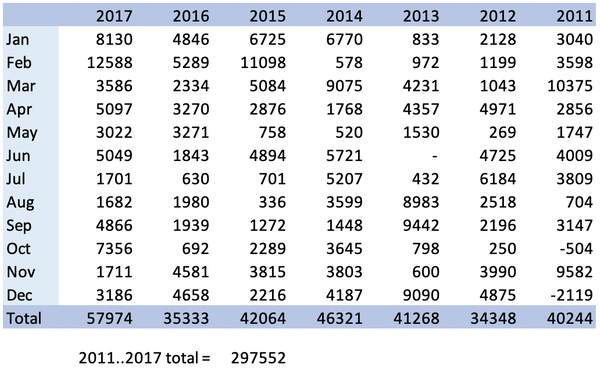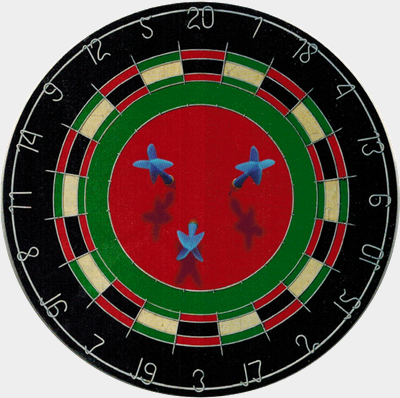Selling Call Options For Income
Selling call options against shares you own (or buying new shares just for this purpose) is a consistent way to earn recurring income. After all, having an asset and not collecting rent on it is opportunity lost. Owning stocks and not selling options against them is like owning an apartment building and not renting out the units.
Does Selling Calls Work Long Term?
Paul Price of TheStreet.com thinks so. In early 2018 he showed how strangers put almost $300K into his IRA over 6 years (over $42K/year) by selling calls to them. Here's a breakdown by month showing the amount of premium he received from selling covered calls 2011 to 2017:

Now, that's just one man's experience. But there are several long term studies showing consistent returns from selling covered calls.
How To Sell Call Options
Selling an option is a simple trade. Just remember each option contract controls 100 shares of stock, so if you own 500 shares of a stock you would sell 5 call options, not 500.
With stocks you use verbs like "buy" and "sell" but with options the verbs are "open" and "close" (short for "open a contract" and "close a contract"). Some brokers use "Sell to open" (or STO) when selling (or shorting) a call option, and "Buy to close" (or BTC) when buying the call option back. Another synonym for "selling a call option" is "writing a call option". You can "sell" it, or "write" it; they are the same thing. In both cases you are technically shorting a call option contract.
Buying Stock And Selling A Call Option At The Same Time
If you are going to simultaneously buy shares and sell a call option against them, then that is known as a "buy-write" transaction, because you are buying the shares and writing (selling) a call option as part of a single transaction. This can be a good way to avoid slippage or being whipsawed when compared to legging in one part at a time. Most brokers have a combo order ticket where you specify the net debit for the two-part trade.
Selling Naked Calls
One thing you do not want to do if you are just learning options is sell naked calls (also known as "uncovered calls"). This would be where you sell the call option but you don't own the underlying stock. It's risky because if the shares shoot way up and the option holder wants to exercise, now you have to go into the open market to buy the shares at whatever price they're at so you can deliver the shares.
Why People Like Selling Covered Calls
First and foremost, it's fairly easy to pick a winner. Like playing this game of darts:

You can set the strike price as low as you want. Lower strikes make for higher probability of profit (bigger bullseye). But if you go too low (bullseye covers almost the whole board) the profit will be tiny. There's a middle ground everyone has to figure out for themselves based on their personal risk/reward tolerance and goals. Some people want 10%/year return (conservative) while others are going for 20% or higher (more aggressive). There's no right answer as to which is best, it depends on the investor.
Second, statistics are on your side. 75% of all options held until expiration finish out of the money. That's good for option sellers, not so good for option buyers.
Third, you get the option premium up front. The day you sell the call option is the day the premium is deposited into your account. Now you can use that cash for whatever you want.
Which Call Options Should You Sell?
If you're "overwriting" (selling call options with strikes above current stock price) and want to keep your shares then ideally sell the call option that finishes just out of the money on expiration day, so that you can sell another one after the current one expires. What strike would that be? Who knows? Where do you think the stock price will be on the expiration day you've chosen? Think about that and then set the strike price a bit higher.
If you are doing "buy-writes" and don't care if (or maybe are hoping) the shares are called away on expiration day, then you want to sell a call option with a strike that finishes in-the-money on expiration day. What strike is that? Don't know. You need to make your own judgement on where the stock price will be on expiration day, and then sell a strike that is lower than that (if you want it called away).
Is Selling Covered Calls The Same As Selling Naked Puts?
They have similar profit and loss characteristics but conceptually are different. We wrote an article comparing the two a while ago. Rather than repeat it all, please see: Covered Calls vs. Naked Puts.
Any Negatives To Selling Call Options?
Yes. You are putting a cap on your upside. Once you sell a call option with a certain strike, the best you can do is receive that strike amount (per share) for all your shares (plus whatever option premium you got when you sold the call option). If the stock shoots up 100% before your option expires then you will only participate in the gain up to the strike price.
Having said that, you are in charge of which strike price you sell, so you can be as conservative or as aggressive as you want. But there's always a chance the shares will exceed whatever strike price you set and you'll only capture part of the gain. If you sell calls for a long time, it will almost certainly happen. But covered call investors are content with less risk and consistent gains as a tradeoff for missing the occasional large gain.
The Tortoise Wins The Race
Selling call options is not get-rich-quick. It may not even be get-rich-slowly. But it is statistically likely to earn a decent annual return, year after year.
Want to try it? Sell Covered Calls With Our Screener
Mike Scanlin is the founder of Born To Sell and has been writing covered calls for a long time.
